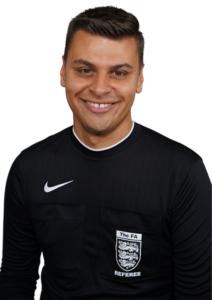The Client:
A 21 year old very highly regarded, CORE (Centre of Refereeing Excellence) referee, who for the purposes of this article, we’ll call Sam, based in the South East of England who had been officiating since he was 14 years old.
The Challenge:
I was advised by Sam that he had suffered a serious tear to his calf in a recent match and that he felt that the place he’d built up to within his CORE group, was in doubt. Sam was very upset about the situation and told me that The FA had notified him that they would support him the best they could. Sam had dreams of refereeing at a professional level of football one day and had been making solid progress in his pursuit to climb the ladder of officiating levels prior to the injury which had taken place around 4 weeks prior to our first meeting. Sam confirmed that this had been his first serious injury and that he was devastated that his season had been shortened. He added that he was trying to remain positive however it was difficult as his mood was very up and down.
The Objectives:
When we discussed possible goals from our work together, Sam was keen to have someone external to talk to so that he could come to terms with the injury and assist in the rehabilitation. He admitted that although he had good support around him, it was a lonely place being an injured referee when you’re used to being around colleagues 2/3 times a week. He also knew that the physical training involved in his recovery would challenge him.
The Process:
We met regularly for 6 months, totalling approximately 26 hours of support.
The sessions included a detailed needs analysis where we discussed his officiating background, other sporting interests, the challenges he faced, his lifestyle, his support system, future goals and mental health challenges because of the situation he was in.
The use of counselling skills was essential as is highlighted below:
I provided listening support for Sam so that he could talk openly about the circumstances surrounding the injury and future implications.
Emotional support was a feature of our work where he expressed his feelings and emotions, including frustration, anger, despair and sadness.
We discussed potential emotional challenges so that Sam could prepare himself for possible obstacles that he may come across in the medium to long term.
Self Determination Theory and the three fundamental needs; autonomy, relatedness and competence which are influential for psychological wellbeing and growth, formed the foundations of some of our work where Sam openly discussed areas of his life and rehabilitation in connection with these needs.
Short and medium-term performance and process goals were a feature of our work to help his focus and motivation levels.
I used principles associated with Cognitive Behavioural Therapy (CBT) to bring about cognitive change and challenge some of Sam’s beliefs.
Sam took to the daily use of a mindfulness body scan which helped him tune into his body, noticing any sensations that he was feeling without judgement. This helped him remain more present and relaxed.
As he returned to training and refereeing shorter and less intense matches we used imagery a lot. I recorded a number of audios so that he could develop the skill and improve the vividness and controllability of images that he produced. The audios included segments where he could see himself officiating at his best, being assertive in decision making, making successful Key Match Decisions (KMDs), judging foul levels correctly, recovering from mistakes, communicating with his colleagues, dealing with pain, remaining calm and relaxed under pressure and more.
The Outcomes:
Sam naturally had ups and downs during the 6 month period though found the safe, private and relaxed sessions away from The FA and colleagues to be invaluable.
He began mentoring newly qualified officials during the course of our programme.
He helped and supported some friends and colleagues on their games.
Sam looked at career options beyond refereeing and was considering doing a business marketing degree whilst climbing the officiating ladder.
Boxing helped him find a useful outlet for his anger.
He enjoyed using the visualisation exercises and found them hugely helpful with his return to training and refereeing.
The Conclusion
Sam’s mental health was impacted by the serious injury however the pro-active support helped him channel his anger at events more positively.
His adherence and focus towards his rehabilitation was very high despite emotional difficulties and setbacks along the way.
He satisfied the basic psychological needs for competence in the way that he applied himself to his rehabilitation and mentoring of newly qualified officials.
By taking up boxing, starting mentoring newly qualified referees and doing research into the business marketing degree he showed that he wanted to take control of the situation with a “can do” attitude as opposed to letting the injury make him feel helpless.
Stepping forth and getting involved in some mentoring was a good distraction and helped Sam feel more connected to people in officiating, once again.
On returning to refereeing he found that he was quickly back up to speed with the help of the visualisation exercises.
At The Third Team I work individually and in collaboration with different professionals where I have developed workshops and 1-2-1 sessions associated with Resilience and Mental Toughness Development to help referees. The workshops and 1-2-1 sessions are interactive, where referees are encouraged to open up and share their experiences to help themselves and each other.
Feel free to contact me if you’d like to know more about my workshops or 1-2-1 sessions and how I could help you or your officials.
Best Wishes

Nathan Sherratt
Referee Educator & Managing Director of The Third Team

Nathan Sherratt
Nathan Sherratt, Referee Educator, Resilience Trainer and Managing Director of The Third Team. A Mental Toughness Practitioner based in County Durham, North East England.

